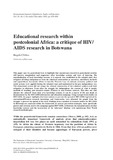| dc.description.abstract | This paper uses the postcolonial lens to highlight that mainstream research in postcolonial societies still ignores, marginalizes and suppresses other knowledge systems and ways of knowing. The marginalization of local knowledge systems, it is argued, was established in the colonial times that relegated all things indigenous or from the colonized communities as unworthy, uncivilized, barbaric and superstitious. Systematic efforts to inscribe Western ways of cultural, economic, political and social systems were applied during the colonial times and maintained in the post-independence era. The educational system did not escape the colonial construction of the colonized subjects and their relegation to otherness. Years after the struggle for independence the content of what is taught, methods of teaching and research remain Western in non-Western contexts. This does not only alienate the ‘othered’ from their own knowledge systems, it can be a matter of life and death as demonstrated by the HIV/AIDS information and education campaign. Using excerpts from studies on HIV/AIDS, the paper highlights that interventions to prevent the spread of HIV/AIDS, legitimized by conventional/Western research knowledge and frameworks, have alienated the people from the struggle to prevent the spread of the virus. Findings from a number of research studies on HIV/AIDS in Botswana are analyzed within the framework of current prevention strategies, more specifically posters and cartoons used in the campaign against HIV/AIDS, to illustrate the marginalization of other knowledge systems and the intersection of the ‘otherness’ ideology with mainstream First World research methodologies. | en |

